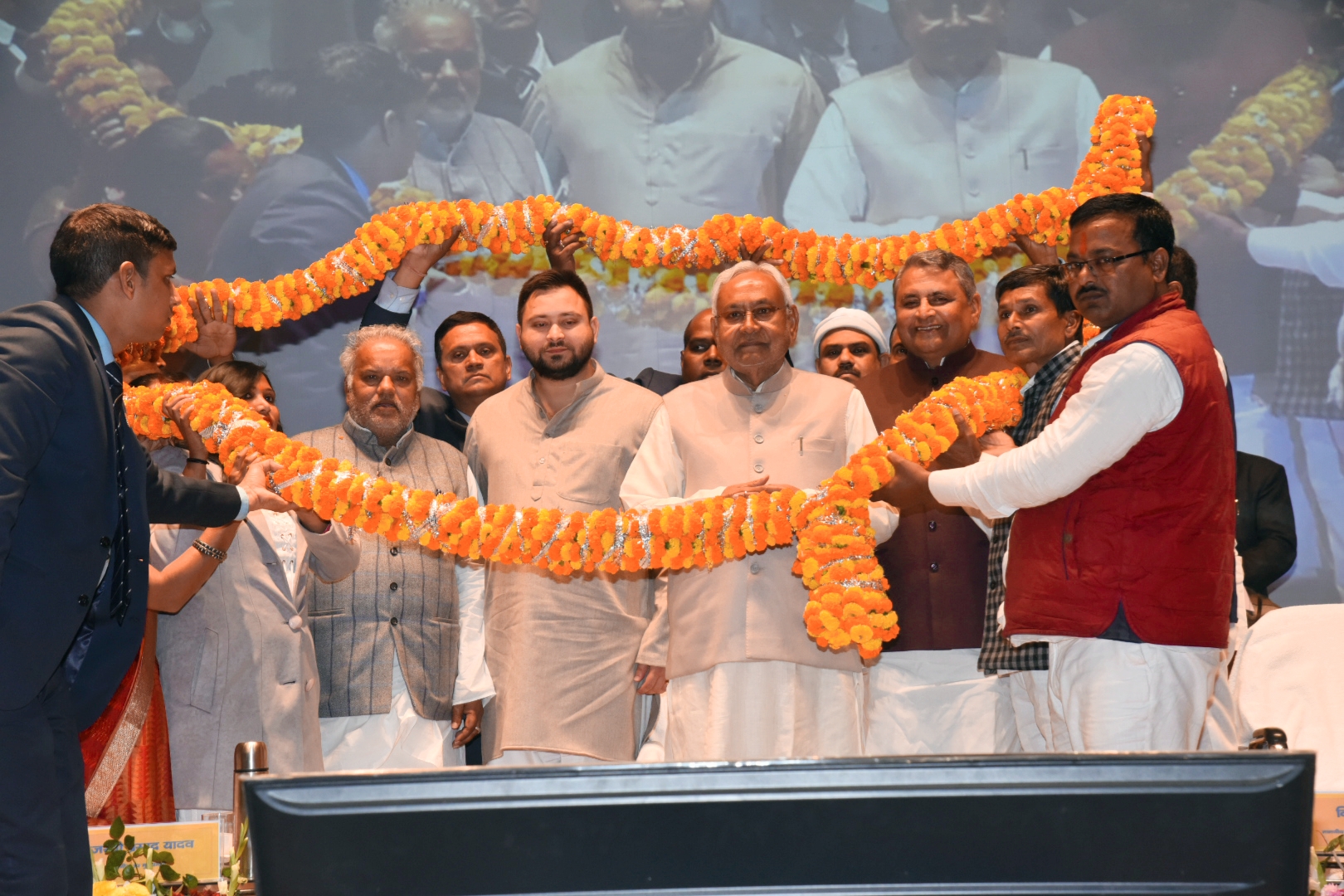NEW DELHI: In the last one week, Bihar Chief Minister Nitish Kumar has twice stated that the de facto chief of the Rashtriya Janata Dal (RJD) and Bihar’s Deputy Chief Minister Tejashwi Yadav will be his successor. Kumar, apart from being the supreme leader of the JDU, is also the leader of the Mahagathbandhan or the Grand Alliance comprising seven parties that are ruling Bihar. On 12 December, Kumar, while speaking at a public event in his home district of Nalanda, in the presence of Yadav and his other cabinet colleagues, said that Yadav needed to be pushed forward for the state’s future. The next day, while interacting with the media in Patna outside the state Assembly, Kumar, while responding to reporters’ queries and holding the hand of Yadav, said the latter would lead the 2025 campaign instead of him. Kumar, holding Yadav’s hand, said, “Ekdum karega, samajh gaye na (Absolutely, he will. Do you understand)?”
It is pertinent to mention that these statements should be read in the backdrop of two incidents that have taken place in the past. On 5 November 2020, while addressing an election rally in Purnia for the Assembly election, an emotional Kumar had announced that it was his last election. Almost two years later, in October 2022, the RJD national executive, which was held in New Delhi, passed resolutions that gave the right to Tejashwi Yadav to change the party’s Constitution, name and symbol, a legal necessity that is needed for any party to merge with any other party.
However, what should come as a concern for both Nitish Kumar and Tejashwi Yadav is that none of the top JDU leaders, including Lalan Singh, the party’s national president or the other constituent of the Grand Alliance—Congress and the Left parties—welcomed this decision in a state where even small political appointments and announcements are celebrated in a grand way. After Kumar, Lalan Singh, who is a Member of Parliament from Munger, is the most prominent and popular leader of the party.
The newly appointed president of Bihar Congress, Akhilesh Prasad Singh, while addressing his first press conference in Patna last week indicated that he was not happy with the statement made by Kumar and said that there was a lack of coordination among the Grand Alliance partners. Singh did not respond to The Sunday Guardian’s queries on Kumar’s announcement regarding Tejashwi Yadav.
Murmurs of dissent against the idea floated by Kumar to name Yadav as his successor have surfaced from within the JDU too. On 14 December, Upendra Kushwaha, the chairman of the National Parliamentary Board, said that “it would be suicidal if the two parties got merged”, while adding that “the very existence of JDU would be at stake”.
Similarly, even RJD leaders, including Tejashwi, have maintained a studied silence on the statements made by Kumar and chose not to react to this.
According to political observers, while Kumar has decided to “retire” from state politics and prepare himself for a possible Prime Ministerial role post May 2024, the other state leaders are more concerned about their political future, which they believe, for the coming few years, will be limited to Bihar.
“Lalan Singh and other JDU leaders are of the view that the chances of an anti-NDA alliance winning enough seats to form own government in the 2024 general election look bleak as of now. Hence, they do not want to count their chickens before they hatch, which Kumar seems to be doing. Singh and Kushwaha know that if the JDU merges with the RJD, JDU will cease to exist. Singh cannot work under Tejashwi, which he would have to in case the merger happens. This explains why JDU leaders have stayed away from ‘celebrating’ the announcement made by Kumar. The RJD, too, has stayed away from fishing in troubled waters as Tejashwi knows that this is not the right time, with JDU leaders themselves not on the same page as far as working under him is concerned,” a senior Patna-based journalist told The Sunday Guardian.
Kumar’s political stature has been dented in recent times with the Grand Alliance’s “surprise” defeat in the Kurhani bypoll, a seat that was held by RJD candidate Anil Kumar Sahni. After Sahni was disqualified, which necessitated the bypoll, Yadav offered the seat to the JDU. Kumar’s hold over the party has also weakened as the JDU in the 2020 Assembly polls could win only 43 seats against the 74 won by the BJP. Both were in an alliance at the time. The JDU had then contested on 122 seats, while the BJP contested on the remaining 121. The Sunday Guardian reached out to Lalan Singh for a response on the possible merger and Kumar’s statement regarding Tejashwi Yadav being his successor. None was received till the time the report went to press.
Party colleagues opposed to Nitish choosing Tejashwi as successor
- Advertisement -

